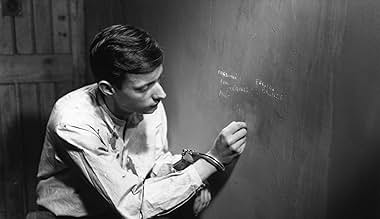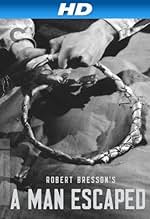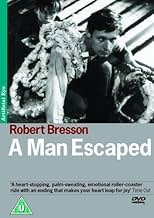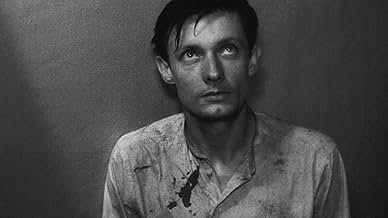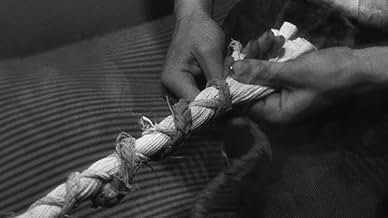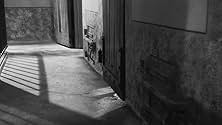Un condenado a muerte se escapa
Título original: Un condamné à mort s'est échappé ou Le vent souffle où il veut
CALIFICACIÓN DE IMDb
8.2/10
30 k
TU CALIFICACIÓN
Un miembro de la resistencia francesa capturado durante la Segunda Guerra Mundial prepara su fuga de una prisión nazi en Francia.Un miembro de la resistencia francesa capturado durante la Segunda Guerra Mundial prepara su fuga de una prisión nazi en Francia.Un miembro de la resistencia francesa capturado durante la Segunda Guerra Mundial prepara su fuga de una prisión nazi en Francia.
- Dirección
- Guionistas
- Elenco
- Nominada a1 premio BAFTA
- 4 premios ganados y 3 nominaciones en total
César Gattegno
- Le prisonnier X
- (sin créditos)
Max Schoendorff
- Un soldat allemand
- (sin créditos)
Resumen
Reviewers say 'A Man Escaped' is lauded for its minimalist style and intense focus on escape from a Nazi prison. Bresson's direction, sparse dialogue, and use of non-professional actors are praised. The deliberate pacing builds suspense and immerses viewers. Some appreciate its authenticity, while others find it less engaging. Leterrien's performance is noted for realism, but opinions vary on its accessibility and emotional impact.
Opiniones destacadas
This movie, perhaps above all others, exemplifies just how important sound is in cinema. In fact, sounds (excluding dialogue) help carry the plot as much as the visuals and dialogue.
The crunching of the gravel under their feet really creates a sense of realism to the story. If you or I were escaping from prison, all the sounds Fontaine must pay attention to we must as well.
I doubt you'll find this film at your local video store, but I encourage everyone to check it out. It's like the Shawshank of the 1950s.
The crunching of the gravel under their feet really creates a sense of realism to the story. If you or I were escaping from prison, all the sounds Fontaine must pay attention to we must as well.
I doubt you'll find this film at your local video store, but I encourage everyone to check it out. It's like the Shawshank of the 1950s.
The stoically minimized material, a man's precisely prepared, calculated, and then executed escape from a Nazi-prison, effectively builds up an astonishingly intense tension. (For that matter, only similar film I can recall is Cluzot's Wages of Fear, made a couple of years earlier.) In this very quiet A Man Escaped, only music is sporadically inserted Mozart, but it might have worked better without any music.
Bresson audaciously began realism and stood alone in pre-New-Wave France, but left tremendous influences on generations of filmmakers to come.
Bresson audaciously began realism and stood alone in pre-New-Wave France, but left tremendous influences on generations of filmmakers to come.
10niezone
What makes a movie great? Sometimes we find it in an actor's performance, sometimes it lies in the plot, maybe is the suspense, or amazing action scenes. "A Man Escaped", a movie by acclaimed director Robert Bresson delivers none of those elements we usually associate with great films. However, the expertise and craftsmanship of Bresson makes for an unparalleled experience, full of non-stop suspense that keeps you at the edge of your seat, captivated by every action and every move. In fact, this is one of the first times in recent memory when I don't end up checking my watch, or looking around, or even exchanging a couple of words with my company. "A Man Escaped" simply doesn't allow you to catch your breath. Bresson is known for his very distinct style, in which his interest goes beyond performances or strong plots, but rather relies on the character of his scenes, in the way he builds each and every take to make you build the environment for yourself. Bresson is the mastermind behind the term "suggestive" cinema. He shows you just enough for you to build the scene on your own and it is such a subtle directing skill, that you don't realize unless you carefully study the art of his direction. Bresson submerges us in a prisoner's routine, inside a process of patience and conviction that eventually pays off. Bresson goes as far as to show us the result of the movie in its very title, fully confident that even when you know what will happen at the end, there is no way you won't feel the increasing tension, and electrifying suspense that starts from the very first scenes. At the end, it is a movie about patience, about the intellect of a prisoner whose will and desire to escape a prison portrays the strengths of the human spirit. However, the movie does not have uplifting phrases that often fall into clichés. This, ladies and gentleman, is what cinema can do for us. Less is more.
A MAN ESCAPED is a great war drama about despair and unbearable circumstances from which a man tries to escape. The main protagonist is an activist of the resistance movement. He was arrested after one action. After the initial shock, the young man begins to plan an escape from prison, and he moves in a race against time because his enemies threaten him with liquidation.
The story is honest and realistic in many segments. The plot is, if we ignore the mystical introduction, very simple. Scenery is confined to a very small space, which directly contributes to an increased sense of fear, despair and anxiety of the main character. Mr. Bresson made the film without specific decorations, classic turnaround and growing tensions. Simply, the focus is on the prisoner who tried to escape. The plot is realistic and spontaneous. One young man must choose between life and certain death. He was on his own in the inner monologue on the difficult road to knowledge.
François Leterrier as Lieutenant Fontaine is calm and dedicated to the inner struggle. His performance is impressive. It's hard to believe that he is not a professional actor. His appearance is unreal and convincing. This is evident in his haggard and engrossed face, bloody shirt and torn stockings.
This film is a reflection of a cruel experience. One man in a desperate, depressed and uncertain fight for his life, or perhaps some form of redemption.
The story is honest and realistic in many segments. The plot is, if we ignore the mystical introduction, very simple. Scenery is confined to a very small space, which directly contributes to an increased sense of fear, despair and anxiety of the main character. Mr. Bresson made the film without specific decorations, classic turnaround and growing tensions. Simply, the focus is on the prisoner who tried to escape. The plot is realistic and spontaneous. One young man must choose between life and certain death. He was on his own in the inner monologue on the difficult road to knowledge.
François Leterrier as Lieutenant Fontaine is calm and dedicated to the inner struggle. His performance is impressive. It's hard to believe that he is not a professional actor. His appearance is unreal and convincing. This is evident in his haggard and engrossed face, bloody shirt and torn stockings.
This film is a reflection of a cruel experience. One man in a desperate, depressed and uncertain fight for his life, or perhaps some form of redemption.
10allyjack
Was there ever a sparer, more concentrated film? The painstaking focus on the ritual-like preparation for the escape is almost wrenching in its calm severity; yet always graceful, always fluid. The details of the final escape make for one of the most memorable sequences in cinema - interspersed with episodes of doubt in which he falters for hours or more before taking the next step, just as he delays the escape itself for many days even though he knows his execution is imminent. It's almost like a sombre dance with death, or at least a morally exacting examination of one's limits and a fear of the transcendent (which in this case is represented merely by freedom itself). There are no moments of light relief or variation here, just an attention to process and causality - the concentration on the plan almost becomes a means of redemption, until carrying out the plan becomes almost superfluous if not destructive. Of all Bresson's films, this is the one that best engages on a thematic level while simultaneously working as narrative - his distilled gravity constitutes a fantastically effective suspense mechanism; a model of tight storytelling.
¿Sabías que…?
- TriviaAfter seeing the film, Jean-Luc Godard said that Robert Bresson was "to French cinema what Wolfgang Amadeus Mozart is to German music and Fyodor Dostoevsky is to Russian literature".
- Citas
Le lieutenant Fontaine: I think my courage abandoned me for a moment and I cried.
- Versiones alternativasAfter the "Fin" title card, there is a version that plays music to a black screen, while another version displays "Exit Music" in white letters against the black screen.
- ConexionesFeatured in De weg naar Bresson (1984)
- Bandas sonorasGreat Mass in C Minor, No.16 (K.427) - Kyrie
Written by Wolfgang Amadeus Mozart
Selecciones populares
Inicia sesión para calificar y agrega a la lista de videos para obtener recomendaciones personalizadas
- How long is A Man Escaped?Con tecnología de Alexa
Detalles
- Fecha de lanzamiento
- País de origen
- Idiomas
- También se conoce como
- A Man Escaped
- Locaciones de filmación
- Productoras
- Ver más créditos de la compañía en IMDbPro
- Tiempo de ejecución1 hora 41 minutos
- Color
- Relación de aspecto
- 1.37 : 1
Contribuir a esta página
Sugiere una edición o agrega el contenido que falta

Principales brechas de datos
What is the Japanese language plot outline for Un condenado a muerte se escapa (1956)?
Responda

